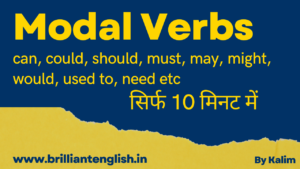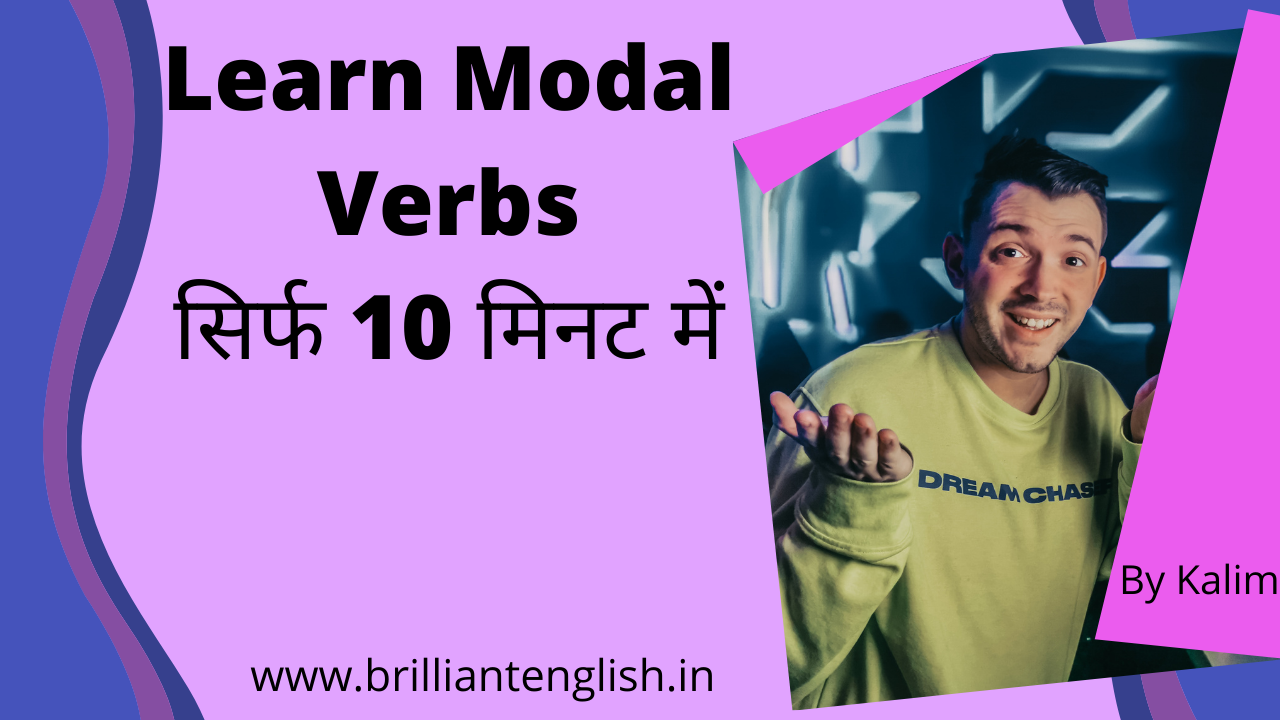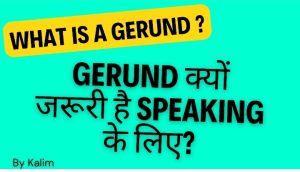The modal Verbs Examples that you must learn if you really you wish to take your English to next level. Each and every person should go for it.
अंग्रेजी बोलना सीखने के लिए सिर्फ Tense का ज्ञान काफी नहीं है, बल्कि हमें Tenses and Modal Auxiliary Verbs दोनों का अच्छा knowledge होना अनिवार्य है। हम आज वही चर्चा करने जा रहे हैं। That would also boost your communication skills and build speaking power.
Here’s the list of all most essential Modal Verbs :
- Can – सकता, सकते, सकती
- Could – सका, सकी, सके
- May – सकता, सकते, सकती
- Might – सकता, सकते, सकती
- Should – चाहिए
- Must – ज़रूर चाहिए
- Will – गा, गे, गी
- Would गा, गे, गी
- Shall – गा, गे, गी
- Used to – करता था
- Need – ज़रूरत
11 modal Verbs Examples in Hindi
English Grammar Modal Verbs rules
1. Modal Verbs के third person वाले verb में ‘s’ नहीं लगता है जैसे eats, speaks, writes etc.
Examples:
He can goes. ( Wrong ) है,
Raju should comes. ( Wrong) है,
2. Modal Verbs के साथ infinitve का प्रयोग नहीं किया जाता है, infinitive बोलते हैं ऐसे Verb को जिसके पहले To लगा रहता है, To read, To write, To learn, To buy etc। जैसे
He can to go. (Wrong) है,
We must to think before. (Wrong)
3. Modal Verbs की विशेषताएं हैं।
“Modal Verbs” दिखाता है _
- Ability – सामर्थ्य
- Power – शक्ति
- Permission – अनुमति
- Request – प्रार्थना/ अनुरोध
- Possibility – संभावना
- Willingness – इच्छा
1. Use of “Can” with examples
Can – 100% possibility/power (संभावना / सामर्थ्य) दिखाता है। बच्चा लकड़ी तोड़ सकता है A child can break wood. इसका मतलब यह है कि बच्चा में ताकत है लकड़ी तोड़ने की A child has the ability to break the wood। कुछ उदाहरण से समझते।
1. तुम कार चला सकते हो ?
You can drive a car.
2. बच्चा नाम लिख सकता है।
A child can write name.
3. बिल्ली चुहे पकड़ सकती है।
A cat can catch the rats.
4. भारत मैच जीत सकता है।
India can win the match.
5. वे लोग पहाड़ चढ़ सकते हैं।
They can climb up the mountain.
6. मैं तुम्हारा साथ नहीं दे सकता।
I cannot help you.
7. पुलिस उसे पकड़ नहीं सकती है।
Police cannot arrest him.
8. क्या तुम मुझे एक चीज़ बता सकते हैं ?
Can you tell me one thing ?
9. तुम उस पर भरोसा कैसे कर सकते हो ?
How can you trust him ?
10. तुम अंग्रेजी बोल सकते हो।
You can speak English.
Can be/become – बन सकते हो
1. तुम नेता बन सकते हो।
You can be a leader.
2. वह लेखक नहीं बन सकता।
He cannot be a writer.
3. क्या हमलोग अच्छे नागरिक बन सकते हैं ?
Can we become good citizens ?
4. वह चोर कैसे हो सकता है ?
How can he be a thief ?

2. Use of “Could” with examples
For ability (संभावना) in past
Note : Could का इस्तेमाल अधिकतर negative sentences में होता है।
1. तुम उससे मिल नहीं सकते।
You could not meet him.
2. हमलोग ट्रेन नहीं पकड़ सके।
We could not catch the train.
3. वह मुझे भुला नहीं सकता।
He could not forget me.
4. तुम कैसे सफल नहीं हो सके ?
How could you not succeed ?
5. मैं आपको सब कुछ बता नहीं सकता।
I could not tell you everything.
3. Use of “should” with examples
For opinion (राय) and suggestions (सलाह) देने के लिए प्रायोग होता है।
1. तुम्हें कोशिश करनी चाहिए।
You should try.
2. हमें झूठ नहीं बोलना चाहिए।
We should not tell a lie.
3. क्या उन्हें यहां आना चाहिए ?
Should they come here ?
4. मुझे फिर कब आना चाहिए ?
When should I come again ?
Should be – होना/बनना चाहिए
1. तुम्हें बहादुर होना चाहिए।
You should be brave.
2. हमें आलसी नहीं होना चाहिए।
We should not be lazy.
3. क्या उसे मेरा दोस्त होना चाहिए ?
Should he be my friend ?
4. हमें कैसे अमीर होना चाहिए ?
How should we be rich ?
Should have – पास होना चाहिए
1. मेरे पास पढ़ने के लिए किताब होना चाहिए।
I should have a book to read.
2. बच्चों के पास मोबाइल नहीं होना चाहिए।
Children should not have a mobile.
3. क्या उनके पास दौलत होना चाहिए ?
Should they have wealth ?
4. लड़का के पास क्या होना चाहिए ?
What should a boy have ?
4. Use of “must” with examples
For compulsion (मजबूरी), strong obligation (कृतज्ञता/ कर्तव्य) इसको भी हम सलाह देने के लिए प्रायोग करते हैं, इसमें ज़ोर दे कर बोला जाता है।
1. हमें ज़रूर बड़ों की इज्ज़त करना चाहिए।
We must respect elders.
2. तुम्हें ज़रूर मास्क पहना चाहिए।
You must put on mask.
3. हमें ज़रूर चुगली नहीं करना चाहिए।
We mut not backbite.
4. क्या मुझे ज़रूर दुसरों का मोबाइल इस्तेमाल करना चाहिए ?
Must we use others’ mobile ?
5. हमें ज़रूर समय पर कर चुकाना चाहिए।
We must pay tax on time.
Must be – ज़रूर होना/बनना चाहिए
1. लड़की को ज़रूर शिक्षित होना चाहिए।
A girl must be educated.
2. बच्चों को ज़रूर ज़िद्दी नहीं होना चाहिए।
The children must not be obstinate.
3. क्या आदमी को ज़रूर अहंकारी होना चाहिए ?
Must a man be arrogant ?
4. हमें ज़रूर लंबा-लंबा नहीं फेंकना चाहिए।
We must not boast.
Must have – पास होना चाहिए
1. हमारे पास ज़रूर लिखने के लिए कलम होना चाहिए।
We must have a pen to write.
2. गरीबों के पास ज़रूर खाना होना चाहिए।
The poor must have food.
3. बच्चा के पास ज़रूर चाकू नहीं होना चाहिए।
A child must not have a knife.
4. क्या उनके पास ज़रूर नौकरियां होनी चाहिए ?
Must they have jobs ?
5. हमारे पास क्यों ज़रूर आधार कार्ड होना चाहिए ?
Why must We have Aadhaar card?
Must for Guess (अनुमान)
जब हम कोई काम होने का अंदाजा लगाते हैं कि काम अभी हो रहा होगा लेकिन हमें sure नहीं पता होता है, जैसे ‘वह ज़रूर स्कूल जा रहा होगा’। लेकिन मैं तो घर पर हूं अल्लाह जाने, कि वह क्या कर रहा होगा, बस एक अनुमान लगाया गया है।
1. आप ज़रूर मेरे बारे में सोच रहे होंगे।
You must be thinking about me.
2. वह ज़रूर घर पर पढ़ रहा होगा।
He must be reading at home.
3. बच्चा ज़रूर स्कूल में खेल रहा होगा।
The child must be playing at school.
4. वे लोग ज़रूर फोन पर बातें कर रहे होंगे।
They must be talking over the phone.
5. मां ज़रूर मेरा इंतजार कर रही होगी।
Mother must be waiting for me.
5. Use of “May” with examples
For possibility (संभावना) 80% and permission (अनुमति) को प्रकट करने के लिए प्रायोग होता है। जब कोई काम होने का chances 80% तक हो।
1. आज मेरा दोस्त मुझसे मिलने आ सकता है।
My friend may come to meet me today.
2. कोलकाता इस साल आई पी एल जीत सकता है।
Kolkata knight riders may win IPL this year.
3. आज शाम तक वर्षा हो सकती है।
It may rain by today evening.
4. क्या मैं आपसे एक नीजी सवाल पूछ सकता हूं ?
May I ask you a personal question ?
क्या मैं वह बैठ सकता हूं ?
May I sit over there ?
क्या मैं आपका मोबाइल देख सकता हूं ?
May I see your mobile ?
Use of “Can and may” for purpose
For telling purpose (उद्देश्य)
1. मैं इस वेबसाइट में आता हूं ताकि मैं अपनी अंग्रेजी सुधार सकूं।
I visit this website so that I can/may improve my English.
2. लोग पार्टी में जाते हैं ताकि वे खाना खा सके और मज़े ले सके।
People go to party so that they can/may have food and have fun.
3. पिताजी काम करते हैं ताकि वे पैसे कमा सके।
Father does work so that he can/may earn money.
Note : ऊपर दिए हुए sentences में हम can या may दोनों में से एक का use कर सकते हैं।
6. Use of “might” with examples
For 30% possibility (संभावना) को बताने के लिए प्रायोग होता है, जब कोई काम होने की संभावना कम हो 30% तक हो।
Note : और जब हम might का प्रयोग करते हैं तो साथ में “शायद” का भी अर्थ निकलता है, फिर अलग से “perhaps” लिखने की कोई ज़रूरत नहीं है
1. वह शायद आज आ सकता है।
He might come today.
2. तुम्हें यह शायद बाज़ार में मिल सकता है।
You might get it in the market.
3. हमें फिर शायद यह दोबारा मौका न मिले।
We might not get this opportunity once again.
4. उसे शायद बाद में पछताना पड़े।
He might regret later.
5. उन्हें शायद इनाम मिला सकता है।
They might get reward.
Might for past for purpose
1. मैंने टापिक बनाया था ताकि मैं अपने क्लास में बोल सकूं।
I made a topic so that I might/could speak in the class.
2. वह गांव गया था ताकि वह अपने दादा-दादी से मिल सके।
He went to the village so that he might/could meet his grandparents.
7. Use of “would” with examples
For offering and inviting ( निवेदन या प्रस्ताव)। जब हम कोई चीज़ या काम के लिए किसी को invite or offers देने कि बात करते हैं तो ‘would’ के साथ ‘like’ को भी मिला कर बोलते हैं। जैसे नीचे के examples देखिए।
1. क्या आप चाय पीना पसंद करेंगे ? Or क्या आप चाय पीना चाहेंगे ?
Would you like to have tea ?
2. क्या आप मेरे साथ भोजन करना पसंद करेंगे ?
Would you like to have dinner with me ?
3. क्या आप फिल्म देखना चाहेंगे ?
Would you like to watch a movie ?
4. क्या आप एक गाना गाना पसंद करेंगे ?
Would you like to sing a song ?
5. क्या आप मेरे साथ नाचना पसंद करेंगे ?
Would you like to dance with me ?
8. Use of “used to” with examples
For past (भूतकाल में बार-बार होने वाले काम) activity which was repeated. ऐसे काम जो हम past में बार-बार किया करते थे। मैं स्कूल जाया करता था, वह नदी में तैरा करता था, आदमी गुफा में रहा करता था इत्यादि। Let’s have a look following sentences.
1. मैं गांव में रहा करता था।
I used to live in the village.
2. वह पेड़ काटा करता था।
He used to cut down trees.
3. हमलोग पतंग उड़ाया करते थे।
We used to fly kites.
Used to be – हुआ करता था
1. वह गरीब हुआ करता था।
He used to be poor.
2. वह मेरा दुश्मन हुआ करता था।
He used to be my enemy.
3. मैं बचपन में शरारती हुआ करता था।
I used to be naughty in childhood.
4. वे लोग मशहूर खिलाड़ी हुआ करते थे।
They used to be famous players.
used to have – के पास हुआ करता था
1. मेरे पास समय हुआ करता था।
I used to have time.
2. उसके पास पैसा हुआ करता था।
He used to have money.
3. आदमी के पास आज़ादी हुआ करता था।
The man used to have freedom.
मोहन के पास कंप्यूटर हुआ करता था।
Mohan used to have a computer.
Modal verbs in English for making a request
Request Sentence वह होता है जिसमें हम किसी से अनुरोध (request) करते हैं कि वह हमारे लिए कोई काम करें तो उसी को request कहते हैं।
There are many ways to make a request sentences with the same meaning.
1. क्या आप दरवाजा बंद कर देंगे / कर सकते हैं ?
ऊपर के वाक्य को हम पांच तरह से अंग्रेजी में बना सकते हैं वो भी अलग-अलग Modal Verbs को use करते हुए। तो देखते हैं।
1. Can you please shut the door ?
OR
2. Could you please shut the door ?
OR
3. Will you please shut the door ?
OR
4. Would you please shut the door ?
OR
सबसे आसान तरीका है।
5. Please, shut the door!
इस तरह से आप English में कोई भी request Sentence को बना सकते हैं। यहां सभी का अर्थ एक ही है।
Hopefully, I am able to explain you something about modal verbs, so please make this effort of mine successful.
See you soon with other one!




